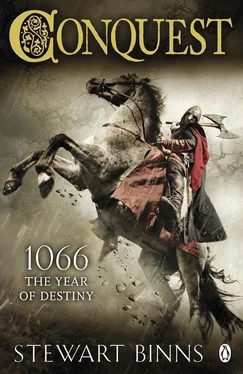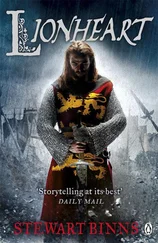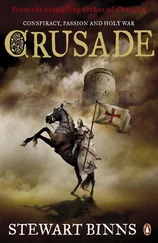The battle for the ramparts took nearly four hours. Hundreds of William’s assault troops were killed and the piles of corpses beneath the ladders grew and grew. However, the men of the Brotherhood had no means of protecting themselves against the torrent of arrows and bolts which, slowly but surely, whittled away at their numbers. It was simply a matter of arithmetic: if William was prepared to send enough men up the scaling ladders, no matter how many were killed, they would eventually overwhelm the defenders.
With his companions constantly at his side, his standard always flying proudly as a beacon to the Brotherhood, Hereward ran along the thin ribbon of defenders. Wherever there was the prospect of a breach, he would stop to lend support. The Great Axe was not effective so close to his own men, but his sword meted out terrible retribution to any Norman foolish enough to clamber over the ramparts within his reach.
By the late afternoon, there was nothing more that Hereward and the defenders could do. The Normans had driven the Brotherhood from the ramparts along most of Ely’s walls and were swarming down the inside stairways. Hereward ordered a shield wall to be formed in front of the abbey; it would be the Brotherhood’s final redoubt.
It was then that Alphonso fell, hit between the shoulder blades by a lance thrown from the ramparts. Much as he tried, he could not get up. Blood poured from the deep wound in his back and, within moments, there was no movement at all.
Alphonso was the finest soldier Hereward had ever known. He could adapt to any conditions, fight on any terrain and use any kind of weapon. He was at his best on his own, or in a small group, and Hereward had learned more from him about the art of warfare than anyone – including William of Normandy, Harold of Wessex and Rodrigo of Bivar.
Now he was dead, killed by an aimless weapon thrown at random by an enemy he never saw.
The Brotherhood’s shield wall held for over an hour, but there were too many Normans and too few Englishmen. As quickly as an English battle-axe cut down a Norman adversary, another replaced him, until the wall was unable to steady itself against the weight of overwhelming numbers. The carnage was horrendous. Men were being hacked to pieces in a flailing mass of swords, axes and spears. Hereward stalked the redoubt with Martin and Einar, constantly moving up and down the line to reinforce weak points.
He was powerless to prevent the blow that killed Einar. He had rushed to a hole in the shield wall and had managed to close it when a spear was thrust between two shields, impaling him below the ribs. He fell to the ground on his knees, clutching at his chest and trying to stem the flow of blood, but it was futile. Hereward managed to get Einar to his feet, but he was losing consciousness. Martin and Edmund came to help; they pulled him away from the melee and laid him down.
He tried to speak, but was fighting for breath. Blood spluttered from his mouth as his chest filled and his lungs were swamped. There was nothing they could do, other than hold him as he fought for air. He looked at Hereward and, despite the pain of his wound and the terror of suffocation, managed to grasp his hand and summon a brief smile. Then he was still. Hereward gently placed his head on the ground, carefully wiped the blood from his face and beard and placed his weapons on his chest. Despite the mayhem just an arm’s length away, Hereward took his time, making sure the mighty Northumbrian met his death in the manner of a noble warrior.
Einar had been proud of his Viking blood, loyal to his English homeland, and a true friend.
By the time Hereward, Martin and Edmund got back to the shield wall it was in disarray. Earl Morcar was frantically trying to encourage the left flank, Thorkill of Harringworth was nowhere to be seen and had presumably perished, but Siward Bjorn still stood on the right, vigorously trying to keep his part of the wall in one piece.
Hereward did a quick count; there were barely 500 of the Brotherhood still fighting.
William summoned his cavalry. With the Matilda Squadron in the centre, the Normans formed up just beyond the walls of the burgh and streamed through the gates in a charge. The Norman infantry parted, to give their cavalry a corridor along which to attack, and they came on at full gallop.
Hereward rushed forward and took a solitary position in front of the shield wall. He ordered the remaining Brotherhood to close ranks behind him, raise their shields and spears and follow him to meet the Norman cavalry head-on. At the final moment, Hereward signalled to his men to fix their spears firmly in the ground and close their shields. Now it was time to deploy the Great Axe of Göteborg.
An irresistible force met an immovable object. Destriers reared and were impaled on spears; men were flung from their mounts and put to death on the ground by battle-axes; knights and sergeants barked encouragement; the fallen cried out in their death throes. Beyond the shield wall stood Hereward, the only man with space around him. Wielding his Great Axe in huge arcs, he fashioned a circle of death, despatching anyone who ventured into it.
He was used to fighting with armies of well-trained soldiers who fought with the steel of professionals, but now he was leading a band of zealots who fought with relentless vigour behind him. Their faith inspired him, multiplying his already prodigious strength, so that he cut swathes through the ranks of Norman cavalry. As he did so, the last of the Brotherhood followed him, wreaking havoc in the Norman ranks. The death toll rose inexorably.
Hereward continued routing all around him, advancing into the Norman lines, until he sank to his knees in utter exhaustion. He tried to raise his shield and axe to parry the blows he knew were about to rain down on him, but he could not; his arms were numb with fatigue and, not wanting to see his slayers, he bowed his head.
The blows did not come. The mayhem ceased. Where, moments ago, there had been the hideous din of battle, there was now silence. Hereward slowly raised his head. He was surrounded by Norman cavalry, its men and horses breathing deeply, clouds of perspiration rising from their bodies. Mounted in the middle of them, red with rage, was William, King of England.
The Norman cavalry parted to allow the King to see the remnants of the Brotherhood. Fewer than a hundred men were clustered in a small group, some on their knees, some trying to get to their feet. The pile of bodies around them was twenty yards wide and in places as high as a man. Hereward could see Edmund, who still held his standard. Next to him was Earl Morcar, covered in blood from head to foot, his chest heaving from the titanic struggle. Martin was on the ground next to Earl Morcar, propping himself up on his elbows, trying to get his breath. He too was drenched in blood, but not his own.
Hereward was relieved to see them, but so many good men were dead. He could see the young monk Rahere lying in a lifeless heap. The bodies of the two young men of Spanish descent, Azecier and Alveriz, were nearby and next to them were the still forms of the two friends Matelgar and Alsinus.
The King ordered that all the survivors be bound and led away. He dismounted to approach Hereward and, as he did so, saw Martin Lightfoot being dragged away.
‘Bring that little Welsh brigand over here. We will deal with him before we devote our attention to the man who thought he could teach a king how to govern his people.’
Martin was made to kneel in front of William and his hands were tied behind his back. Four knights approached Hereward and held him while his hands were also bound. He had further bindings tied around his elbows, knees and ankles. A noose was put around his neck and pulled, forcing his head backwards and his chin in the air. Then the noose was tied to his ankle bindings, leaving him with no freedom of movement.
Читать дальше












